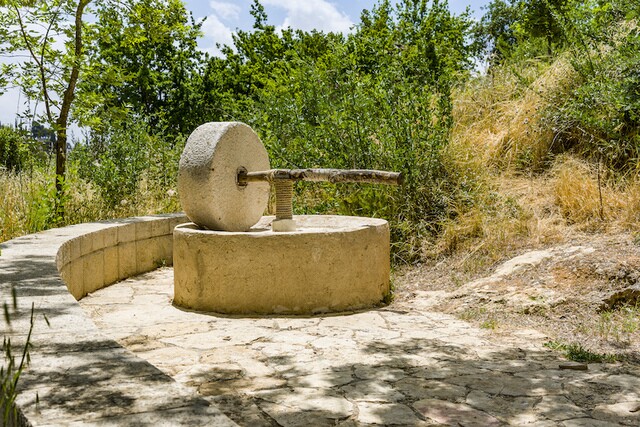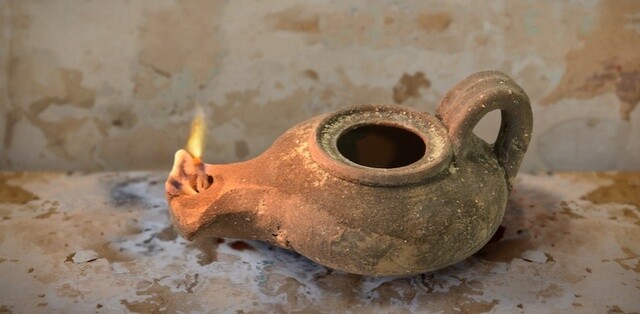While watching the 2021 BYU Women’s Conference, a single sentence from Elder Ronald A. Rasband’s address brought back a memory from when I was a student at BYU’s Jerusalem Center.
Telling the parable of the ten virgins, Elder Rasband said, “The five who were foolish showed up, but without an important element to provide light. They had no oil to light their lamps. Oil came from olives that had been soaked, purged of impurities, and crushed in the press and collected in vessels. It was a lot of work to get oil.”
I can vouch that it is hard work to make oil. Olives are harvested in Jerusalem during the fall, which happened to be the time of year when I was living there. As students, we had the opportunity to pick the fruit straight off the trees on the campus grounds. We were all excited to participate, but it wasn’t the easiest process and we were sometimes poked by the prickly branches while reaching for the olives and plopping them into our buckets.
Afterward, we placed the olives on a bed stone and then pushed on a large round beam that moved a millstone on top of them. The millstone was heavy enough that it required several students to push at once. Later we placed the olive mash in baskets, stacking them on top of one another. These baskets were then squeezed in an olive press.

The process took most of the afternoon, and later we were given a tiny vial of oil that could be used for priesthood blessings. The time, effort, and help of others, not to mention the location of the Mount of Olives, made this small amount of oil particularly precious to me. And because I worked for it, I valued it all the more.
While reflecting on these experiences, the value of working for our “oil” in a spiritual sense took on new meaning for me. The process isn’t easy, and you cannot skip steps—becoming more like Christ requires a concentrated effort as we try to follow all of His commandments. But beyond that, as I heard Elder Rasband share the story of the ten virgins, I came to realize how those verses in the Bible are a beautiful reminder of what the Savior sacrificed for us and that we are all beloved children of God.
Putting in the Work
In 2005, David E. Sorensen, then of the Presidency of the Seventy, spoke in a devotional address at BYU about the blessing of work.
“Work is an eternal principle. Whom do you know who has all the riches of the earth and more and yet is continually working? Our Heavenly Father! He is a worker. Our Heavenly Father and Jesus Christ have shown us by Their examples and teachings that work is important in heaven and on earth.”
Heaven and earth. Sometimes, doesn’t it seem like all we have to do is survive and work hard in this life, so that we can have fun in the next? But work is never ending. In his talk, Sorensen shared how the Savior is always working, and that He continues to do so today.
In the Pearl of Great Price we read, “This is my work and my glory—to bring to pass the immortality and eternal life of man” (Moses 1:39; emphasis added). This, of course, includes every man, woman, and child. Of all the things He could concern Himself with, our Heavenly Father has chosen to labor for the benefit of our eternal souls—your soul and my soul.
► You may also like: 'There's never an end': The surprising response President Nelson gave to a Primary child's question that changed my understanding of the gospel
But in the parable of the ten virgins, those who were foolish did not put in the necessary work. At midnight, when the bridegroom came much later than they expected, they arose and trimmed their lamps—except those who were unprepared could not. Their lamps were out, and when they asked for oil, the wise did not share theirs. Elder Rasband explained this response in his address.
“Now your first thought might be, Why didn’t the wise sisters share? What about ‘charity never faileth?’ Weren’t they ministers who helped their sisters in need? Were they heartless and stingy? No. Oil represented more than what came in a jar. They were wise because they had been collecting oil in the press of life, always striving to live faithful to their covenants with the Lord,” he said.
Still, couldn’t the wise virgins have just given a little bit of their oil to help the other women get by? But symbolically speaking, Elder Rasband says, the oil simply could not be shared.
“Their oil and yours is best described as love for God the Father and His son, Jesus Christ, as a desire to live with integrity, fulfilling our promises. Oil comes from worship in the temple, connection to and gratitude for families past and present, partaking of and honoring covenants with the Lord, doctrinal understanding gained by studying the words of the Lord in scripture and from living prophets. ... In the account, the foolish were off to, let’s say, Costco. You cannot buy oil of testimony. They had not taken the Holy Spirit for their guide. And their vessels remained empty,” he said.
Why He Suffered
The foolish virgins’ circumstance is saddening not only because their lamps could not be filled, but because the work required of them was small in comparison to what was offered them. In his October 2016 general conference address, Elder D. Todd Christofferson described how the process of pressing oil symbolically relates to Christ’s Atonement. To draw out the last drops of oil, he says, weighted stones are used on one end to “create the maximum, crushing pressure” and “the oil is bloodred as it first flows out.”
He then quotes Matthew’s account of the Savior in Gethsemane:
“‘And he went a little further, and fell on his face, and prayed, saying, O my Father, if it be possible, let this cup pass from me: nevertheless not as I will, but as thou wilt.’
“Then, as I imagine the distress grew even more severe, He pleaded a second time for relief and, finally, perhaps at the peak of His suffering, a third time. He endured the agony until justice was satisfied to the very last drop. This He did to redeem you and me.”
It’s humbling, to say the least, to think that no matter no matter how many drops we put in our lamps, it would not be sufficient without the drops of blood the Savior shed for us. But if we put in the effort to know Him and keep the commandments, we will be prepared to meet Him when the time comes. Elder Rasband said that to fill our lamps, we must have deeper knowledge of the Savior and follow in his footsteps:
“The five who were foolish had not filled their inner vessels, their very souls with the knowledge of Jesus Christ as the Son of God, the Holy one of Israel, the Good Shepherd, the Lamb of God, the Messiah, and Redeemer, and the Only Begotten of the Father. We come to know our Father by following the example of the Savior who stated, ‘I came into the world to do the will of my Father because my Father sent me. So have we come into the world for the same purpose.”
Elder Rasband then testified of why the Savior suffered for each one of us:
“At the end of His ministry, Jesus Christ atoned for all the sins of God’s children. His Atonement included His suffering in the garden and on the cross, the shedding of His blood, His death, and His resurrection from the grave. He had taken upon himself the harshest moments of all mortals. ...
“Would he have willingly suffered so, blood seeping from every pore, if each of us was not a child of God? He was cruelly abused, subjected, [tormented of] nonbelievers, humiliated, unjustly sentenced, and crucified on a cross with thieves on either side and then buried in a borrowed grave. How did he respond? With this plea to His Father: ‘Forgive them; for they know not what they do.’”
I love this thought—that Christ willingly died for us because we are children of God. Of course, He suffered because it was the will of the Father and He wanted to bring about God’s greatest work so that we all may be saved. But the fact that His Atonement is a testament of our divine identity as children of God is powerful and nothing short of miraculous to me.
Knowing that I am a child of God who the Savior sacrificed for makes me want to be better at filling my lamp. It makes me want to work harder, to learn of Him, and to keep His commandments because He died for me. I might only be filling my lamp one drop at a time.
But each drop counts.


